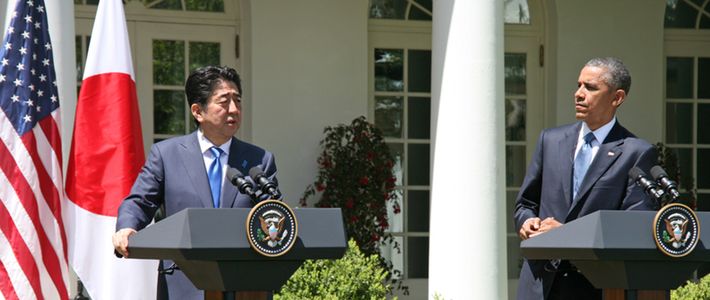
Prime Minister Abe’s Trip to the United States: The Official and the Unofficial
Politics- English
- 日本語
- 简体字
- 繁體字
- Français
- Español
- العربية
- Русский
Prime Minister Abe Shinzō’s eight-day trip to the United States from the end of April to early May was, officially speaking, a success. He was welcomed warmly in the four stops he made―in Boston/Harvard University, Washington DC, San Francisco/Stanford University, and Los Angeles―by his American hosts, most of whom viewed him as a reformer on economic issues and an advocate of strong US-Japan security ties.
In reality, however, Abe had both an “official” and an “unofficial” reception. The “official” reception was positive because President Barack Obama’s administration faces so many problems domestically (Obamacare, immigration policy, race relations, slow economic recovery, and so forth) and internationally (Iran, Iraq, Syria, Libya, Israel, Afghanistan, North Korea, and Russia, among others).
Warm Welcome for a Valued Partner
In the midst of all these problems, most Americans see Japan as a valuable ally and partner that can be relied upon to provide needed support. On issues of national security in particular, the Obama Administration has welcomed the Abe government’s measures, including devising a new national security strategy, increasing the defense budget, creating a National Security Council, enacting a State Secrets Protection Law, relaxing the ban on the export of arms, exercising the right of collective self-defense, and revising the US-Japan security guidelines to facilitate closer bilateral defense cooperation.
On economic issues, Abe is seen in the United States as a reformer―but one who has devoted perhaps too much of his efforts to the first arrow (monetary policy) and second arrow (fiscal policy) of his Abenomics program, and not enough to the third arrow (structural reform and growth policy), to ensure Japan’s long-term sustained growth. Although the economic results so far have been mixed, there is still hope that he will exercise his political leadership to achieve the promised structural reforms under the third arrow and to reach an agreement soon on the Trans-Pacific Partnership.
During the prime minister’s visit to Washington DC, I was invited to three official events held in his honor: the lunch at the State Department hosted by Vice President Joseph Biden and Secretary of State John Kerry on April 28, the official state dinner at the White House hosted by President Obama that evening, and the speech to the joint session of Congress hosted by House of Representatives Speaker John Boehner on April 29. In each case, the American hosts welcomed Prime Minister Abe warmly and appreciated his emphasizing the common bonds of friendship, values, and interests between the two countries.
A Cooler Response in Other Quarters
The “unofficial” reception of Prime Minister Abe is reflected in the letter issued on May 4 signed by 187 scholars of Japanese studies entitled “Open Letter in Support of Historians in Japan.” Signed by some of the leading Japan scholars in the United States, Europe, and Australia―including John Dower, Ezra Vogel, Akira Iriye, Ronald Dore, and Gavan McCormack―the letter states: “This year presents an opportunity for the government of Japan to show leadership by addressing Japan’s history of colonial rule and wartime aggression in both words and action.” Although worded diplomatically, it is clearly intended to urge Prime Minister Abe to go beyond the Kōno Statement of 1993 and Murayama Statement of 1995 and to take action that will resolve the issue of “comfort women.”
This letter was in reaction to Prime Minister Abe’s speech to the joint session of Congress on April 29, which focused on the postwar reconciliation between Japan and the United States and the strong bilateral relationship that has developed over the past 70 years. The fact that his speech did not address broader issues of history, including the issue of comfort women, led many to see it as a missed opportunity. According to several of the signers, the letter was written in the hope that Prime Minister Abe would address these issues and attempt to resolve them in the 70-year postwar anniversary prime ministerial statement he is expected to make in August of this year.
Looking Ahead to Abe’s Summer Statement
It will be interesting to see to what extent, if any, such a letter will affect Abe’s August statement. One view would be that given his strong desire to “escape the shackles of the postwar regime,” he will refuse to repeat such words as “colonial rule,” “aggression,” and “heartfelt apology,” which were included in the Murayama Statement, and that the letter, already denounced by some of Abe’s supporters as an “unwanted attempt to meddle in Japanese domestic affairs,” will lead him even more to take a defiant position against a conciliatory approach. Another view would be that, as a realist and pragmatist, Abe will use the August statement as a way to show his attempt at reconciliation with South Korea and China on issues related to history, thereby at least partially defusing tensions and gaining praise for his efforts from the international community, including especially the United States.
Meanwhile, on the three Japan-related issues of highest priority for the United States―national security, economy, and history―the prime minister’s recent visit yielded, based on numerous discussions this author had with relevant Americans, a score of 8 (on a 10-point scale) on national security (regression on the Futenma/Henoko issue on Okinawa is a minus), 6 on the economy (slow progress on the third arrow and no bilateral agreement yet on TPP), and 3 on history (no clear statement to resolve the issues). If progress is made later this year on Okinawa, TPP, and history, US-Japan relations should be in relatively good shape as the United States enters the presidential election primaries season in 2016.
(Banner photo: Prime Minister Abe and President Obama speak to reporters after their summit meeting on April 28, 2015. © Jiji.)
diplomacy politics Abe Shinzō alliance Barack Obama Japan-US bilateral